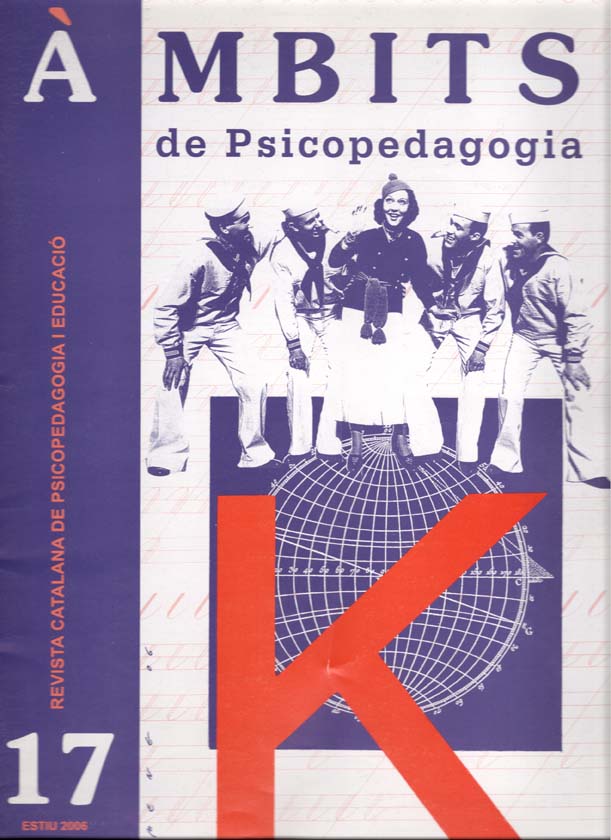What do cognitively challenged pupils need in order to develop communication and language in the best possible manner?
Abstract
Students with cognitive disability need special help in order to develop communication and language. The idea that language development depends upon the cognitive development it is only one theoretical hypothesis among others which cannot be used to deprive cognitively challenged pupils of the needed help, while waiting for the unspecific, and insuficient by itself, cognitive progress to give impetus to language development. In this paper the author presents facts, arguments and opinions with the intend that they may serve to think about the role of the school in the language development of the cognitively challenged student.
References
Acosta, V. (2005) Evaluación, intervención e investigación en las dificultades de lenguaje en contextos inclusivos. Revista de Logopedia, Fonologia y Audiología, 25 (4), 148-161.
Aimard, P. y Abadie, C. (1992) Intervención precoz en los trastorns de comunicación en el niño. Barcelona: Masson.
Berry, P. (ed.) ( 1977) Language and communication in the mentally handicapped. London: Edward Arnold.
Burakk, J. A; Hodapp, R.M. i Zigler, P. (1998) Handbook of mental retardation and development. New York: Cambridge University Press.
Chapman, R.S. (1998). Language and cognitive development in children and adolescents with Down syndrome. In J. F. Miller, L. A. Leavitt i M. Leddy (Eds.), Communication development in children with Down syndrome. Baltimore: Brookes Publishing Co.
Dockrell, J. i McShane, J. (1997) Dificultades de aprendizaje en la infancia: un enfoque cognitivo. Barcelona: Paidós.
Fenn, G. (1977). Against enriched environment, a P. Berry, The language and communication in the mentally handicapped. London: Edward Arnold.
Font, J. ( 2005) La evaluación del alumnado con retraso mental. A M. Sánchez-Cano i J. Bonals (eds.) La evaluación psicopedagógica. Barcelona: Graó.
Galeote, M. (2002) Adquisición del lenguaje: problemas, investigación y perspectivas. Madrid: Pirámide.
Garton, A. (1994) Interacción y desarrollo del lenguaje y la cognición. Barcelona: Paidós.
Giné, C. (ed.) (1999) Trastorns del desenvolupament i necessitats educatives especials. Barcelona: EDIUOC. (Retard mental, pàgs 19 a 108)
Goldstein, P. (2004) Helping young children with special needs develop vocabulary. Early Childhood Education Journal, 32 (1), 39-43.
Goodman, K. (1990) El lenguaje integral: un camino fácil para el desarrollo del lenguaje. Textos de didáctica de la lengua y de la literatura. 3, 77-91.
Kaiser, A. P.; Hester, P.P. y McDuffie, A. S. (2001) Supporting communication development in young children with developmental disabilities. Mental retardation and developmental disabilities: Research Reviews. 7, 143-150.
Lewis, V. (1991) Desarrollo y dèficit. Barcelona: Paidós (Caps. 1, 5, 7 i 8).
Oates, J. i Grayson, A. (2004) Cognitive and language development in children. Oxford: Blackwell.
Rees, N. (1986) Pragmática del lenguaje, en B.L. Schiefelbusch (ed.) Bases de la intervencion del lenguaje. Madrid: Alhambra.
Reichle, J. i Keogh, W.J. (1985) Communication intervention: a selective review of what, when, and how to teach, en S.F. Warren i P. Rogers-Warren (eds.) Teaching functional language. Austin, TX: Pro-Ed.
del Rio, M.J. (1997) Factores interpersonales y desarrollo del lenguaje en pesonas connecesidades educativas especiales, en M.J. del Rio (ed.) (1997) Lenguaje y comunicación en personas con necesidades educativas especiales. Barcelona: Martínez Roca.
del Rio, M.J.; Vilaseca, R.M. i Gràcia, M. (1997) La interacción y el desarrollo comunicativo y lingüístico en niños con deficiencia mental, en M.J. del Rio (ed.) (1997) Lenguaje y comunicación en personas con necesidades educativas especiales. Barcelona: Martínez Roca.
del Rio, M.J. (2003) La orientación psicolingüística en el estudio del lenguaje, en V. Acosta y A. Moreno, Dificultades de lenguaje e inclusión educativa. Barcelona: Ars Médica.
Rondal, J.A.; Lambert, J.L.; Chipman, H. H. i Pastourieux, F. (1988) Retraso mental, en J. A. Rondal i X. Seron (eds.) Trastorns del lenguaje II, Barcelona: Paidós.
Rondal, J.A. (1993) Modularidad del lenguaje. Datos, teorías e implicaciones terapéuticas. Revista de Logopedia, Fonologia y Audiología, 13 (1),14-22.
Rondal, J.A. i Edwards, S. (1996) Language in Mental Retardation. Londres: Wiley.
Rondal, J.A. i Ling, D. (1997) Interacciones verbales adulto-niño y construcción del lenguaje: El problema del feedback. Revista de Logopedia, Fonologia y Audiología, vol.XVII, (1) 11-20.
Sánchez-Cano, M. (1995) Hablemos claro. Estrategias de ayuda para la comunicación y el desarrollo lingüístico de los alumnos extranjeros, Textos de didáctica de la lengua y la literatura, 6, 117-128.
Sánchez-Cano, M. y del Rio, M.J. (1995) La interacción en el aula. Textos de didáctica de la lengua y la literatura. 3, 24-31.
Urquía, B. y del Rio, M.J. (1999) Interacció a l'aula especial i adquisició del llenguatge d'una nena amb Síndrome de Down. Suports: Revista catalana d'educació especial i atenció a la diversitat., 3, 3, 66-75.
V.V.A.A. (2002) Jocs i activitats per assolir el curriculum de l’etapa infantil de l’Escola Taiga. Barcelona: Icaria Editorial.
Verdugo, M. A. i Canal, R. (1986) Procesos cognitivos en las personas con retraso mental. A: M. A. Verdugo. Las personas con retraso mental. Salamanca: Publicaciones de la Universidad de Salamanca.
Vilaseca, R.M. y del Rio, M.J. (2004) Language acquisition by children with Down syndrome: a naturalistic approach to assisting language acquisition. Child Language Teaching and Therapy, 20,2, 163-180.
Downloads
Published
Issue
Section
License
The authors maintain their copyright and give the right to the first publication of the work to the journal, registered under a Creative Commons Attribution-Non Commercial-NoDerivs license. This license allows others to download the works and to share them with others as long as they credit the author, but it does not allow for any kind of modification or commercial use.















